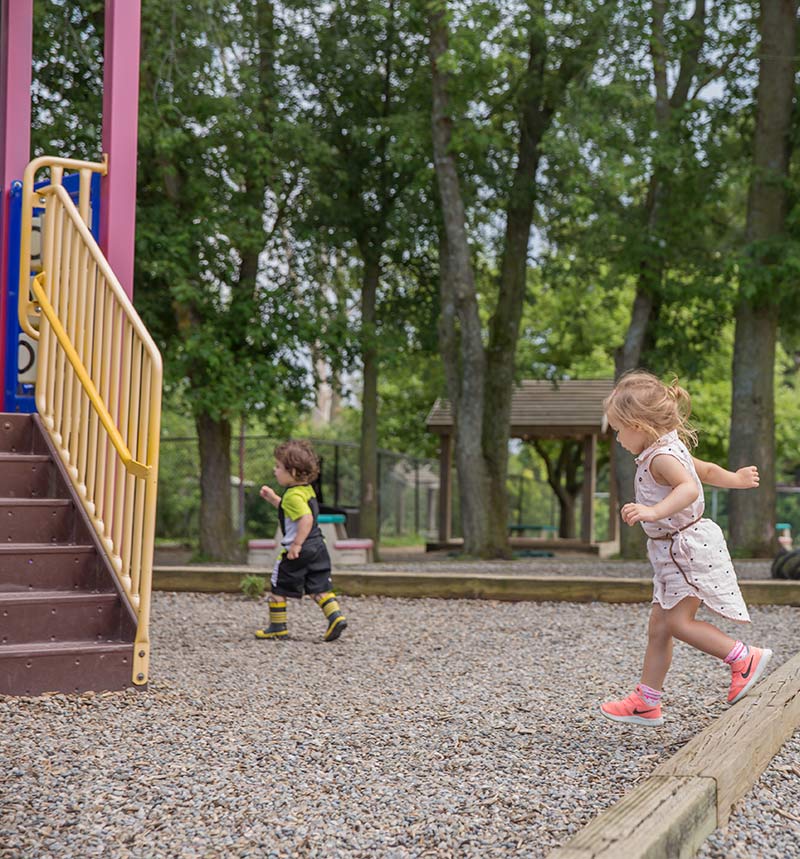Montessori Infant and Toddler
The Montessori Toddler Program – Ages 18 months to 36 months
At around 18 months, your child is ready to be introduced to the Montessori Toddler program. This program has 4 main curriculum areas and includes toilet training. The class ratio is 1:5 and the Head Teachers have Montessori Toddler qualifications and one teacher holds an ECE diploma. The goals of the Toddler program are as follows:
- Care of self (increased independence, including toilet training)
- Care of the environment (putting materials where they belong, so everyone can always find them)
- Development of hand-eye coordination
- Development of vocabulary, language skills
- Development of gross motor skills
- Development of Grace and Courtesy
- Development of independent work habits, including making independent work choices
- Gradual separation from the primary caregiver

Practical Life – Exercises will help develop independence, increase concentration and help develop fine motor skills. The materials are attractive to the child and respond to their desire to master everyday skills such as opening and closing containers, manipulating locks & keys or nuts & bolts, buttoning and zippering, pouring, scooping, self-care and care for their indoor/outdoor environment.
Sensorial – Materials isolate specific sensory concepts, such as size, colour, shape, sound, texture, etc. Children learn the language associated with these concepts and learn how to make sense of their environment.
Language – Exercises at this level are mostly designed to enhance vocabulary. Children will learn to associate an object to its name and discover the difference between concrete and abstract. These activities will make it possible for the child to speak in a precise way and it will aid in growth and independence. As a child is seen to be ready, they would also begin work to prepare their hand for writing (early metal insets) and learn the phonetic sounds of the alphabet letters.
Culture – Exercises include the exploration of History, Geography and Science at an age appropriate level. In History the focus is on days, months and special events. In Geography we explore the Globe, Map of the World and animals of the world. In Science we do age appropriate experiments and learn about the 3 elements of the earth.
Gross Motor – Development is a daily component of the Toddler program. They will visit the Gross Motor room every day to play on specially designed equipment that helps develop coordination and muscle strength.
In addition to the Toddler curriculum, children will receive French instruction once a week, as well as weekly visits to the gym. Outdoor Education and School Visits also enrich their experience.
PREPARING YOUR CHILD
To make your child’s adjustment to school a happy time for both of you, you may find the following suggestions useful:
- If your child has not been left away from home before, arrange to leave him at a friend or relative’s home for short periods of time before school starts.
- When leaving child at school, a positive, confident attitude on the part of the parent is very important.
- A quick hug & kiss goodbye is most beneficial to the success of your child’s day.
- Please do not come into the room and linger as it gives your child the impression that you are staying with them. As a result, when you leave, the separation is much worse for your child.
- Be confident that a staff member will call you if your child is unable to settle.
IN THE HOME
The home is important for continuing the type of learning which the child has begun in the Montessori class. The child can continue his good working habits and enrichment can be provided at his own level of interest. Like the Montessori teacher, Montessori parents should respect the individual interests and aptitudes of their child and try to provide the best conditions for his development. By working alongside his mother or father, a child can absorb many useful skills and acquire hobbies of lifelong interest. Parents should take time to explain things to the child in simple terms and let him experiment and participate in daily activities and chores.
ADJUSTMENT PERIOD
A positive, confident attitude on the part of the parent is very important when a child starts school. This can be a very difficult time for parents too, particularly if the child is upset. We have observed that for a parent to stay and watch their child only prolongs the anxiety and it is easier on the child to say a calm goodbye and leave. However, be sure your child understands you will be back to pick him up in a few hours. We will contact you if your child is upset and does not calm down within a reasonable time frame.
